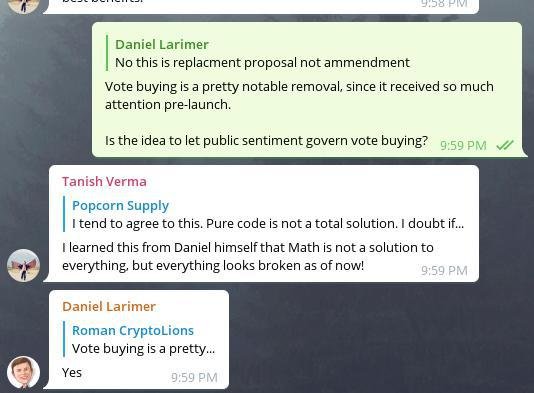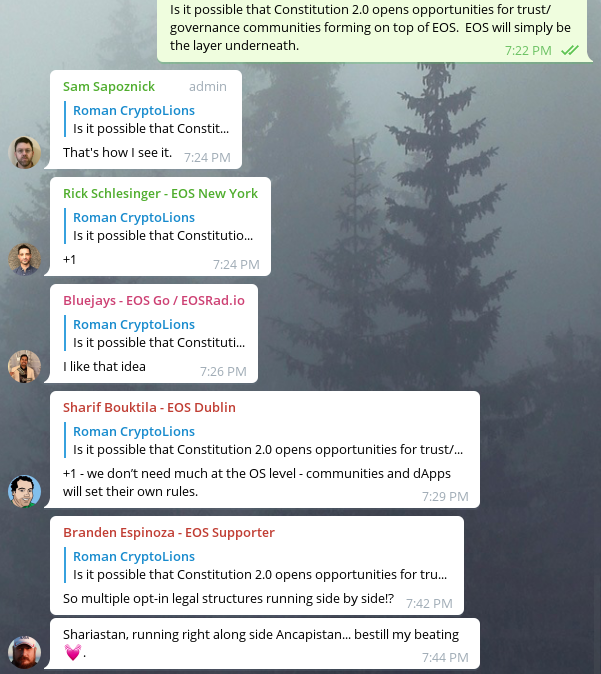The EOS Community is experiencing whiplash from Block One's Constitution 2.0 proposal. The proposal, which must pass a referendum before becoming official, represents not only an adjustment of the Launch Constitution, but a significant philosophical shift.
The central principle of Constitution 2.0 seem true to the title of the announcement: the intent of code is the law.
This stands in contrast to the earlier paradigm which seemed to be simply "the law is the law."
Why are we here?
In its first three weeks of life, EOS has seen some chaos and uncertainly, especially surrounding the arbitration system and the extent of its powers. We have been trying to bootstrap a justice system without articulating its scope and jurisdiction. Ie. without clearly defining what it should govern.
Block One described the risks of a runaway justice system,
Users of the EOS blockchain need some guarantees from the community in order to feel safe and secure. If everything on the blockchain is subject to mob-rule, then no one is safe. If the community does not have strong, objective, organizing principles, then everything is subject to interpretation and becomes unpredictable and arbitrary. The ensuing debates and conflict can tear a community apart.
and described the "need for objective boundaries".
Objective Boundaries
We believe there are various ways to define objective boundaries for EOS governance. The proposed Constitution 2.0 is just one way. It defines these boundaries by drastically reducing the scope of default EOS governance.
The only thing EOS governance would do under Constitution 2.0 is answer the question "did this software do what the description (Ricardian Contract) said it would do?"
That's it. Even the prohibition on vote buying was removed.
Defining these boundaries is necessary, but the most important characteristic of Constitution 2.0 is the philosophical shift.
It lessens explicit legal pressure, and insists that social pressures rise to fill the void.

New Opportunities
Should 2.0 get ratified, the plans and ambitions of many aspiring founding fathers and founding mothers will be dashed by the drastic reduction in scope of default EOS governance. Some members of the EOS community are already expressing disappointment, likely fueled by all the time and passion they invested in designing more elaborate EOS governance.
However, 2.0 would also open a new frontier for digital governance.
If default governance becomes just a default base layer for screening bugs and malicious software, then aspiring founders of digital nation can now design their visions on top of EOS and convince people to join it voluntarily.

It would be a much more difficult assignment, of course. They won't be inserting their vision for governance as part of the package deal. But now people would freer to design their own governance structures, be they mutual aid societies, guilds, sororities or fraternities, insurance cooperatives, or whatever else.
The pressures of voluntary membership and competition would surely create a few diamonds. 💎
Lingering Questions
If 2.0 were adopted, could we, the EOS community, form coalitions, articulate principles, and draft resolutions quickly enough to suppress the undesirable behaviors which are no longer expressly forbidden by the Constitution?
How would we go about it? And most importantly, would it be enough?
Perhaps we should work toward a universal code of conduct, and also a block producer code of conduct, and use all the social pressure which our reputations can muster to cast out violators.
Perhaps we should work toward setting a precedent that only signatories of certain declaration can use basic Dapps and EOS Tools.
What an interesting and mad experiment!
Let's have the debate
Since this is such a significant pivot, we encourage Block One to invest time in hearing arguments and building consensus to preserve what has thus far been an extraordinary ability of the EOS Community to cooperate.
Any governance framework must not only consider foreseeable circumstance, but also provide enough structure to govern the unforeseeable.
The EOS governance model is (was?) a significant distinguishing factor over other chains, and while we should most definitely engage in discussion - considering the significance of the proposed philosophical shift, rushing to rip it out at the roots seems heavy handed, and could further (negatively) impact the community.
Consensus is hard - lets take the time to get there, together.
I agree BP code of conduct and 2/3+1 goverment consensus only in severe situations in smart contracts.
If somebody make a risk transaction should protect with a multisig, not with a goverment